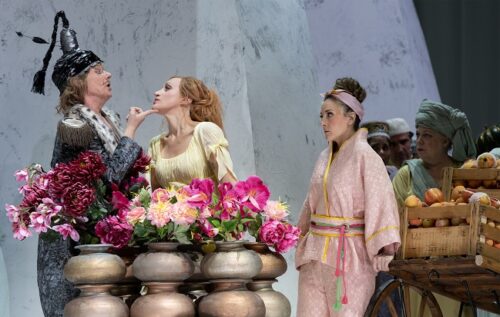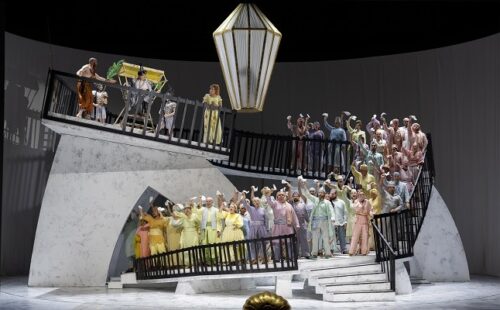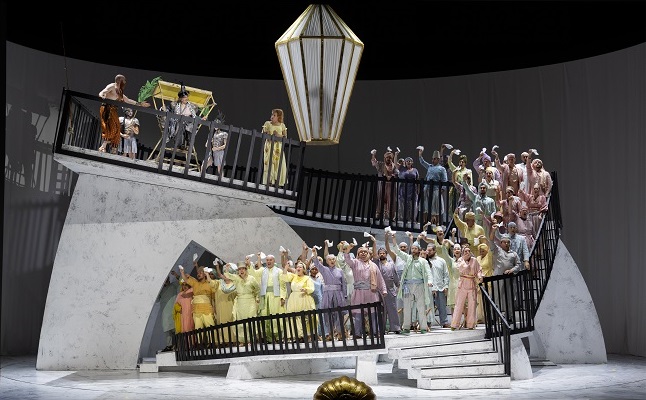 Switzerland Offenbach, Barkouf: Soloists, Chorus of Zurich Opera, Philharmonia Zurich / Jérémie Rohrer (conductor). Zurich Opera, 23.10.2022. (MF)
Switzerland Offenbach, Barkouf: Soloists, Chorus of Zurich Opera, Philharmonia Zurich / Jérémie Rohrer (conductor). Zurich Opera, 23.10.2022. (MF)

Production:
Director – Max Hopp
Set – Marie Caroline Rössle
Costumes – Ursula Kudrna and Sebastian Helminger
Lighting – Franck Evin
Chorus director – Ernst Raffelsberger
Choreography – Martina Borroni
Dramaturgy – Kathrin Brunner
Cast:
Bababeck – Marcel Beekman
Le Grand-Mogul – Andreas Hörl
Saëb – Mingjie Lei
Kaliboul – Daniel Norman
Xaïloum – Sunnyboy Dladla (replaced Andrew Owens)
Maïma – Brenda Rae
Balkis – Rachael Wilson
Périzade – Siena Licht Miller
Narrator – André Jung
Barkouf! Thanks to the title’s onomatopoeia it takes little imagination to hear the canine protagonist’s barks, growls and, well, ‘woufs’ but it also includes this three-act opera’s characterisation as ‘bouffe’. And there is more. Jacques Offenbach’s opus, based on Eugène Scribe’s libretto, takes us to the far away town of Lahore where Barkouf the dog is enthroned as ruler.
The Zurich premiere is only Barkouf’s third ever rendering. It made its debut in 1860 at the Paris Opéra Comique, where it was censured and locked away after only a handful of performances, deemed too critical of Napoleon III’s Second Empire.
While the score does include the odd harmonious and light-footed three-quarter time sing-along tunes, as we know them from La Belle Hélène, for example (composed four years later than Barkouf), the music bears further witness to both Offenbach’s skill and genius. His virtuosity and inimitable style are there, his inexhaustible melodic inventions, taste for parody and critical derision and the lively vitality of waltz and polka rhythms. The orchestra also ventures into dissonances, orientalism in the instrumentation and even polytonality, virtually unheard of – and most definitely unexpected – at the time. Indeed, politics no doubt played an important part in consigning the piece to oblivion, but of an equally damning effect was Hector Berlioz’s verdict, who in the Journal des Débats rhetorically wondered whether the composer had ‘lost his mind’. It took another century and a half until the Opéra national du Rhin in Strasbourg unearthed the piece in 2018 for a production also shown in Cologne a year later.
The Great Mogul of Lahore, the ‘ruler of all rulers, star of all stars’ appoints Barkouf, the dog, as the head of government to humiliate his rebellious people. Unsurprisingly the Great Mogul’s plan backfires. Rather than triggering humiliation, Barkouf is loved by the people, he is celebrated as the best ruler they ever had. The dog’s success is not of its making alone, of course. His barked rulings are proclaimed by the flower girl Maïma, Barkouf’s former owner turned official translator. Taxes are halved for the poor and insurgents condemned to death by the tyrant are acquitted. Alongside all this, a happily ending love story unfolds too, Maïma will get to tie the knot with her Saëb by the end of the evening.
Director Max Hopp and Marie Caroline Rössle (stage) together with Ursula Kudrna and Sebastian Helminger (costumes) deliver in full on Hopp’s promise to present the audience with a ‘fat piece of cream gateau’. Accordingly, the costumes cover a broad range from gentle pastel oriental gowns to over-the-top uniforms worthy of any Roman centurio awaiting defeat by Asterix. The stage is dominated by a M. C. Escher revolving spiral staircase of gigantic proportions – on, around and under which the action is set. Being faced with the full cast plus the generously staffed chorus in corpore on the structure conveys an almost overly rich feeling of saturation.

Hopp’s directing demands quite some acting from the cast. No wonder, since in his previous life as an actor Hopp was no stranger to heavy duty performing himself. He has worked for Frank Castorf in Zurich and in 2019 he impersonated a dozen or so roles simultaneously as John Styx in Barrie Kosky’s Orphée aux enfers in Salzburg. That perhaps spurred Hopp to author narration replacing the original (and partly lost) dialogues. The actor Andre Jung reports, recapitulates, comments and explains the plot as the evening unfolds, on occasion dissolving the boundaries between theatre and reality when directly addressing and being addressed by the singers with actual names. Admittedly, those spoken parts did add length. And Jung did not appear entirely at ease with his text.
The cast – Offenbach requires no less than four tenors – was a bit of a mixed bag on premiere night. Given the opera’s hitherto apocryphal life, it was an evening of role debuts. Marcel Beekman (Bababeck, a main conspirator) seemed somewhat dragged down by his heavy plateau shoes but brought moments of playful joy nonetheless. Mingjie Lei as Saëb and Daniel Norman as Kaliboul were reliably comic. Xaïloum was sung by Sunnyboy Dladla (member of the 2019 Köln cast and replacing Andrew Owens, who was indisposed, at very short notice). Although he needed some time to adapt to the orchestra, by the end he delivered a full-throated and engaging performance.
The three female roles made for absolute highlights. Brenda Rae as Maïma and Rachael Wilson as Balkis were simply splendid. Rae, a seasoned Queen of the Night and Zerbinetta, is a powerful, agile and charming coloratura soprano who visibly enjoyed the acting. Wilson’s mezzo voice has a fascinating combination of roughness and enthralling delicacy. Siena Licht Miller’s Périzade was versatile and light.
Choreographer Martina Borroni is given plenty of room to underscore Barkouf’s revue facet. Her ensemble of eight dancers provides entertaining interludes and makes surprising appearances as a Can-Can troupe, clad in Rio carnival gear – and transformed into a pack of dogs (which reminds us: we never actually get to see the eponymous protagonist).
Finally, director Jérémie Rohrer takes charge of the evening’s musical drive. The founder of the period instruments orchestra Le Cercle de l’Harmonie leads the excellently disposed Philharmonia Zurich and the well-balanced chorus. Together they navigate the complex and varied score, aptly modulating between finely swinging operetta waltzes, bel canto melodiousness and grand opera in full blast with all voices on deck.
The premiere curtain calls were met with avid applause throughout. Further performances will be on 27 and 30 October, 4, 6, 9, 13, 17, 19 and 22 November.
Michael Fischer
